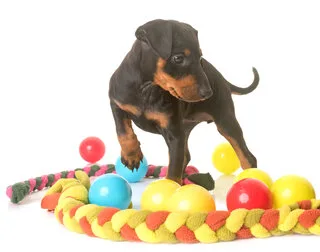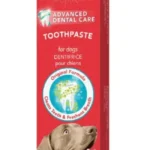Does your four-legged friend seem obsessed with that squeaky toy you bought them? Although it’s normal for dogs to enjoy playing with their toys, some may go above and beyond by howling at the squeaks they produce. “Why does my dog howl at squeaky toys?” Is it just an odd quirk of theirs, or does it mean something more? In this blog post, we’ll explore the reasons behind a pup’s fascination with squeaky toys and discuss ways to ensure enjoyable playtime for everyone!
The Science Behind the Howl
The reason dogs howl at squeaky toys is often linked to their inherent prey drive. The squeaky sound these toys make simulates the high-pitched noises that injured or cornered prey would make. Thus, the squeaking triggers an instinctive response in your dog. They may whine or cry, howl, or even start nipping at the toy to ‘kill’ it.
The Howl Maybe More Than a Prey Drive
While the prey drive theory certainly has merit, it is not the only explanation for why dogs howl at squeaky toys. Another popular theory is that the squeaky sound is similar to the high-pitched noises of their canine companions, triggering a pack mentality. Dogs are naturally social animals, known for their communal howls when communicating with each other. When your dog hears the squeaky toy, they may interpret it as another dog calling out and respond with a howl of their own.
Also, dogs love playing with these toys simply because it’s fun. The noise a squeaky toy makes can be very satisfying and exciting for a dog. As they bite down and hear the ‘squeak,’ they often perceive it as the toy interacting with them. This offers mental stimulation and keeps them engaged for longer periods.
Moreover, some dogs may cry or whine at their squeaky toys because they associate the noise with getting attention from their owners. They’ve learned that the squeaky sound often results in you focusing on them, whether to join in the play or take the ‘noisy’ toy away.
Do Dogs Love the Squeak?
Contrary to what you might think, dogs don’t necessarily love the squeaky sound, per se. Instead, they’re reacting to their instincts. Some dogs might become overly excited or even stressed by the noise. The reaction varies greatly among individual dogs, with some showing more intense responses due to a stronger prey drive.
Can Squeaky Toys Hurt Dogs’ Ears?
While dogs have more sensitive hearing than humans, the squeaky sound produced by these toys is unlikely to hurt their ears. It’s important to monitor your dog’s reactions, though. It might be worth considering quieter alternatives if they appear uncomfortable or anxious around their squeaky ball or other toys.
The Impact of Squeaky Toys on Dogs’ Ears: Fact or Fiction?
There’s a common belief among some dog owners that the sound from squeaky toys could potentially hurt a dog’s ears due to their acute sense of hearing. However, according to PetMD, this isn’t likely to be the case.
Dogs can hear a wide range of frequencies – from approximately 40 Hz to 60,000 Hz – compared to humans, who can only perceive sounds between 20 Hz and 20,000 Hz. Even though dogs are sensitive to high-pitched noises, the squeaky sound from toys typically falls within the safe range for their hearing. However, observing your dog’s reaction to their squeaky toy is always important. If they seem distressed or start howling excessively, swapping the squeaky ball for a quieter toy might be best.
Nevertheless, most dogs love to play with squeaky toys and show no signs of discomfort or distress. So, why does your dog howl at squeaky toys? It’s largely due to their inherent instincts and the enjoyment they derive from the interaction.
What Do Other Dog Owners Say?
According to several dog owners on platforms like Reddit and Quora, their dogs enjoy playing with squeaky toys, but this is not a universal sentiment. Some owners have noted that their dogs become obsessed with the toys, potentially leading to destructive behavior. Therefore, observing your dog’s unique reactions and behavior is essential.
Community Input on Squeaky Toys and Dogs
For more insight, let’s delve into what other pet parents say about their dogs and their reactions to squeaky toys. From lively discussions on DogForum, many dog owners find that their furry friends love the interaction and excitement these toys provide.
In contrast, others express concern about their canines developing a ‘prey drive’ obsession. Whether your dog whines, howls, or even cries at these toys, it seems the consensus among dog owners is that each canine’s response is unique and rooted in their behaviors and instincts.
Why Does My Dog Cry When I Squeak a Toy?

Seeing a dog crying or howling at the sound of a squeaky toy can be puzzling for dog owners. So, why does your dog cry when you squeak a toy? The answer lies in understanding your dog’s instincts and behaviors.
Dogs have an inherent prey drive, and the squeaky sound a toy makes can mimic the high-pitched noises that a prey animal might produce. This sound can trigger an instinctive response in your dog, causing them to cry or howl. They are not in distress; rather, they are reacting to their instincts.
There’s also the possibility that your dog associates the squeaky sound with getting attention from you. If you’ve given your dog more attention when they play with squeaky toys in the past, they may have learned that squeaky noise equals attention. Hence, when the toy squeaks, your dog might cry or howl to get your attention.
Moreover, the sound a squeaky toy makes can mentally stimulate your dog. As they bite down and hear the ‘squeak,’ they might interpret it as the toy interacting with them. This interaction keeps them engaged and can be very exciting for them.
However, remember that each dog is unique. While some dogs may start howling or crying at the sound of a squeaky toy, others may not react. Observing your dog’s behavior and reactions is important to understand what they enjoy and what may cause them stress. If your dog seems distressed by the squeaky sound, it might be best to consider quieter toys.
In conclusion, your dog’s reaction to squeaky toys is largely rooted in their instincts and behaviors. Whether they howl, cry, or enjoy playing, it’s all part of their way of interacting with the world around them.
What is the Best Type of Toy for Dogs?
When looking for alternatives to squeaky toys, you might want to consider interactive, chew, or puzzle toys for your dog. Interactive toys can help to keep your dog mentally stimulated and physically active. Toys like balls or frisbees are excellent for playing fetch and promoting physical activity.
Chew toys can be ideal for dogs that enjoy gnawing, and they also contribute to dental health by cleaning the dog’s teeth and reducing plaque and tartar. Here are some great indestructible toys for your dog.
Puzzle toys, however, can keep your dog busy for hours. They often involve hidden treats that your dog needs to figure out how to access, providing mental stimulation and rewarding problem-solving. Remember, every dog has unique preferences, so it might take some experimentation to determine what your dog likes best.
As always, if your dog starts acting strangely or shows signs of distress, for instance, flinching suddenly, it is recommended to take it to the vet. Conditions like vestibular disease, seizure disorders, or progressive retinal atrophy in older dogs can cause a dog to flinch and should be evaluated promptly.
Unleashing the Ultimate Guide to Dog Toy Shopping
Choosing the perfect plaything for your dog isn’t as simple as it seems. It’s a strategic game that should factor in your dog’s size, love for chewing, and need for mental stimulation. Here are some insider tips to help you make the perfect choice:
- Size Matters: The size and shape of the toy should be a perfect fit for your dog’s mouth. A toy too small could be a choking hazard, while an oversized toy might be less fun for your little friend.
- Durability is Key: If your canine companion is a seasoned chewer, opting for durable toys can save you money (and a trip to the vet). Flimsy toys can break into dangerous pieces, so always choose quality over quantity.
- Feature-Rich Fun: Toys that can hold treats or make noise add a layer of excitement and mental stimulation. They are like puzzle games for your pet, keeping them engaged and satisfied.
- Safety First: Always ensure the toy is non-toxic and safe for your furry friend. You wouldn’t want their playtime turning into a health hazard.
So, remember, the best toy for your dog is not just about entertainment, it’s about safety, durability, and mental engagement too. Happy shopping!
Understanding “Why does my dog howl at squeaky toys?” is rooted in understanding their natural behaviors and instincts. Whether your dog cries, howls, or whines at their toy, they engage in an activity that feels natural and satisfying. Always remember each dog is unique, so keep an eye on their reactions and adjust their playtime accordingly.





